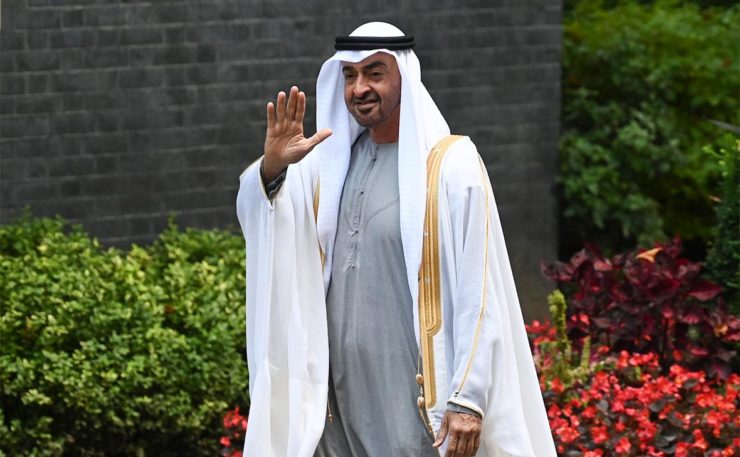
Almost a year ago, on 29 March 2023, Sheikh Khaled bin Mohamed bin Zayed Al Nahyan was appointed Crown Prince of the Emirate of Abu Dhabi. Since then, the crown prince of the United Arab Emirates’ (UAE) main principality has sought to increase his influence in the political arena and strengthen his standing among local citizens. Sheikh Khaled’s efforts are primarily aimed at becoming the first in a chain of contenders to succeed the Emirati throne after his father, UAE President Sheikh Mohamed bin Zayed Al Nahyan.
Prince Khaled’s ascent began long before his appointment. Thus, as part of realising his own political aspirations, Khaled, who was appointed chairman of the Abu Dhabi Executive council (ADEC), has been increasingly involved in the emirate’s internal governance. In addition, the Sheikh has marked his presence at the UAE government’s annual meetings on 7-8 November 2023, where he actively participated in discussions on artificial intelligence exports and other innovation-related issues. Notably, these meetings are attended by federal and local government officials.
Recently, Khaled’s intense rapprochement with Sheikh Maktoum bin Mohammed bin Rashid Al Maktoum, Federal Minister of Finance and Deputy Ruler of the Emirate of Dubai, has been traced. Analysts assume that the development of relations between the young sheikhs is designed to relay to others the unity of the future ruling tandem of the main emirates of Abu Dhabi and Dubai in the economic policy of the UAE. Experts also note that this manoeuvre is part of a well-thought-out strategy and is in the interests of the duo.
Notably, Maktoum, like Khaled, is preceded in line for the throne of Dubai by his elder brother Hamdan bin Mohammed Al Maktoum, who currently holds the position of crown prince of the emirate. However, Maktoum’s stature has grown considerably in the past few years, especially after he was handed the federal finance portfolio in 2021. Observers speculate that Dubai may also see changes in the chain of succession over time.
As well as being active in the political arena and building tactical alliances, Sheikh Khaled has been busy developing ties among local influential clans. Over the past few months, he has attended numerous wedding receptions in Abu Dhabi, including events of the Al-Madi, Al-Mansouri, Al-Mazroui, Al-Kemzi, Al-Kaabi and Al-Ketbi families. The Sheikh also attended a mass marriage ceremony in Abu Dhabi, where more than 4 dozen citizens of the country entered into matrimony at the same time. This strategy greatly boosted Khaled’s quotations among the local population, especially the Bani Yas tribesmen. At the same time, the Sheikh attended, on behalf of his father, the wedding of Jordanian Crown Prince Hussein bin Abdullah II and Saudi national Rajwa Khaled Al-Saif in Amman.
However, despite Khaled bin Mohammed’s considerable efforts, there remain a number of dossiers in which he appears relatively weak. For example, he lacks the weight in the security bloc as well as the influence in the UAE’s financial sector enjoyed by his uncles and potential rivals — National Security Adviser Sheikh Tahnoun bin Zayed Al Nahyan and Federal Vice President Mansour bin Zayed Al Nahyan. Unlike his father, who developed his career in the UAE’s armed forces in order to build a strong backbone that later enabled him to become the country’s president, Sheikh Khaled has sought alternative ways to connect with the security forces. Thus, since January 2017, he has been the deputy national security adviser to Sheikh Tahnoun. Khaled also fulfils some of the functions of the Minister of State Security as the chairman of the State Security Department.
In order to consolidate his status in the security forces, Khaled attended the graduation ceremony for cadets of the UAE National Defence Academy and also used the visit of the Dubai Airshow.
In addition, Khaled’s political platform lacks an economic component. For example, Mansour bin Zayed, after being appointed president by MBZ, took the post of chairman of the national investment company Mubadala, while Tahnoun bin Zayed developed a financial network through his control over the international holding company ADQ and other organisations.
Khaled’s strategy, however, does not involve mimicking the financial activity of his rivals. Instead, the progressive sheikh is developing megaprojects and innovations, including the Genomics Council (developing personalised preventative healthcare for UAE citizens), the Sirb space programme Sirb technology ecosystems (Hub71), scholarship platforms, new educational approaches (RizeUp) and programming schools (42 Abu-Dhabi).
This approach may, in the long term, help Khaled bin Mohammed avoid the difficulties faced by his predecessors and rivals who linked politics and business too closely. This fact provoked the anger and resentment of many local companies and businesses that felt disadvantaged when they had to compete with business-dominated members of the ruling family. Khaled also considers the reputational costs of scandals involving members of the royal family, when the boundaries between public and private sector contracts and personal gain became very tentative.
Given the signals that Khaled is receiving from his father MBZ about the growing Russian presence in the UAE due to Western sanctions, primarily in offshore platforms and the oil sector, there is room for the young sheikh to turn around. The fact is that Khaled is a figure in the Pandora Archive, where he is mentioned in connection with his partnership with an offshore investment company. The Sheikh is involved through a company called Desroches Island Limited, of which he himself is the sole shareholder.
It is common knowledge that financial secrecy trading is rampant in the UAE. The state offers shell companies that mask the identities of their real owners, dozens of internal free trade zones in which they can hide in even greater shadows, and a regulatory system known for what anti-corruption advocates call its “ask no questions, see no evil” approach. Engaging with shadowy Russian businesses in this intangible space could also make a significant contribution to Sheikh Khaled bin Mohammed’s ascension to the Emirati throne.
Madi Khalis MAALOUF, political observer, especially for online magazine “New Eastern Outlook”.